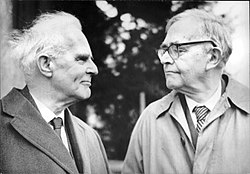Emil Brunner
This article has multiple issues. Please help improve it or discuss these issues on the talk page. (Learn how and when to remove these template messages)
|
Emil Brunner | |
|---|---|
 Brunner (left) with Karl Barth | |
| Born | Heinrich Emil Brunner 23 December 1889 Winterthur, Switzerland |
| Died | 6 April 1966 (aged 76) Zürich, Switzerland |
| Spouse |
Margrit Lautenburg (m. 1916)Swiss Reformed Church[2] |
| Ordained | 1912[2] |
| Academic background | |
University of Berlin | |
| Thesis | The Symbolic Element in Religious Knowledge[a] (1913) |
| Influences | |
| Academic work | |
| Discipline | Theology |
| Sub-discipline | Systematic theology |
| School or tradition | Neo-orthodoxy |
| Institutions | University of Zurich |
| Doctoral students | |
| Part of a series on |
Dialectical theology |
|---|
 |
|
|
Heinrich Emil Brunner
Biography
Brunner was born on 23 December 1889 in Winterthur, in the Swiss canton of Zürich.[9]
He studied at the universities of
In 1921, Brunner published his Habilitationsschrift (a post-doctoral dissertation traditionally required in many countries in order to attain the position of a fully tenured professor) on Experience, Knowledge and Faith and in 1922 was appointed a Privatdozent at the University of Zurich. Soon after, another book followed: Mysticism and the Word (1924), a critique of the liberal theology of Friedrich Schleiermacher. In 1924 Brunner was appointed Professor of Systematic and Practical Theology at the University of Zurich, a post which he held until his retirement in 1953. In 1927 he published The Philosophy of Religion from the Standpoint of Protestant Theology and second The Mediator.
After accepting various invitations to deliver lectures across Europe and the United States, in 1930 Brunner published God and Man and in 1932 The Divine Imperative. Brunner continued his theological output with Man in Revolt and Truth as Encounter in 1937. In the same year he was a substantial contributor to the
Brunner's ecclesiastical positions varied at differing points in his career. Before the outbreak of the war Brunner returned to Europe with the young Scottish theologian
Brunner holds a place of prominence in Protestant theology in the 20th century and was one of the four or five leading systematicians.[citation needed]
Theology
Brunner rejected liberal theology's portrait of
Some[
In any event, Brunner and his compatriots in the
Although Brunner re-emphasized the centrality of Christ,
Relationship with Karl Barth
Brunner was considered to be the chief proponent of the new theology long before Barth's name was known in America, as his books had been translated into English much earlier. He has been considered by many to be the minor partner in the uneasy relationship.[citation needed] Brunner once acknowledged that the only theological genius of the 20th century was Barth.[citation needed]
Selected works in English
- The Mediator, (translated by Olive Wyon; The Lutterworth Press 1934, reprinted Cambridge 2003)
- Our Faith (1936)
- The Divine Imperative (1st German edition 1932; English translation 1937 and 1941)
- Man in Revolt. A Christian Anthropology (1st German edition 1937; English translation 1939 and 1941)
- Revelation and Reason. The Christian Doctrine of Faith and Knowledge, (1st German edition 1941, English translation 1946)
- Christianity and Civilisation (1949) Gifford Lectures Delivered at the University of St Andrews, James Clarke & Co, reprinted Cambridge 2009
- Dogmatics. Volume I: The Christian Doctrine of God, (1950) reprinted James Clarke & Co, reprinted Cambridge 2003
- Dogmatics. Volume II: The Christian Doctrine of Creation and Redemption, (1952) reprinted James Clarke & Co, Cambridge 2003
- Dogmatics. Volume III: The Christian Doctrine of the Church, Faith and the Consummation, (1950) reprinted James Clarke & Co, Cambridge 2003
- Eternal Hope (1954)
- The Great Invitation Zurich Sermons, (1955) The Lutterworth Press, Cambridge 2003
- I Believe in the Living God. Sermons on the Apostles' Creed, (1961) reprinted The Lutterworth Press, Cambridge 2004
- Justice and Social Order, The Lutterworth Press, Cambridge 2003
- The Letter to the Romans, The Lutterworth Press, Cambridge 2003
- The Misunderstanding of the Church, The Lutterworth Press, Cambridge 2003
Notes
References
Footnotes
- ^ Craver; Schoch 2012.
- ^ a b McGrath 2014, p. 4.
- ^ McGrath 2014, p. 5.
- ^ Livingstone 2013, p. 79.
- ^ a b c d e Kegley 2005.
- ^ McGrath 2014, p. 2.
- ^ Menacher 2013, p. 312.
- ^ "Brunner". Random House Webster's Unabridged Dictionary.
- ^ McGrath 2014, p. 1.
- ^ Schoch 2012.
Bibliography
- Craver, Ben D. "Heinrich Emil Brunner (1889–1966)". In Wildman, Wesley J. (ed.). Boston Collaborative Encyclopedia of Western Theology. Boston: Boston University. Retrieved 19 February 2019.
- Kegley, Charles W. (2005). "Brunner, Emil". Encyclopedia of Religion. Thomson Gale. Retrieved 19 February 2019 – via Encyclopedia.com.
- ISBN 978-0-19-965962-3.
- ISBN 978-1-118-56926-9.
- Menacher, Mark D. (2013). "Gerhard Ebeling (1912–2001)". In Mattes, Mark C. (ed.). Twentieth-Century Lutheran Theologians. Göttingen, Germany: Vandenhoeck & Ruprecht. pp. 307–334. ISBN 978-3-525-55045-8.
- Schoch, Max (2012). "Brunner, Emil". Historical Dictionary of Switzerland (in French, German, and Italian). Retrieved 19 February 2019.
Further reading
- Bautz, Friedrich Wilhelm (1990) [1975]. "Brunner, Emil". In Bautz, Friedrich Wilhelm (ed.). ISBN 978-3-88309-013-9. Retrieved 19 February 2019.
- Humphrey, J. Edward (1976). Emil Brunner. Waco, Texas: Word Books. ISBN 978-0-87680-453-7.
- Jehle, Frank (2006). Emil Brunner: Theologe im 20. Jahrhundert (in German). Zürich: Theologischer Verlag. ISBN 978-3-290-17392-0.
- Jewett, Paul King (1961). Emil Brunner: An Introduction to the Man and His Thought. Chicago: InterVarsity Press. OCLC 422230677.
- Kegley, Charles W., ed. (1962). The Theology of Emil Brunner. New York: Macmillan. OCLC 393141.
- Williamson, René de Visme (1976). Politics and Protestant Theology: An Interpretation of Tillich, Barth, Bonhoeffer, and Brunner. Baton Rouge, Louisiana: Louisiana State University Press. ISBN 978-0-8071-0193-3.
